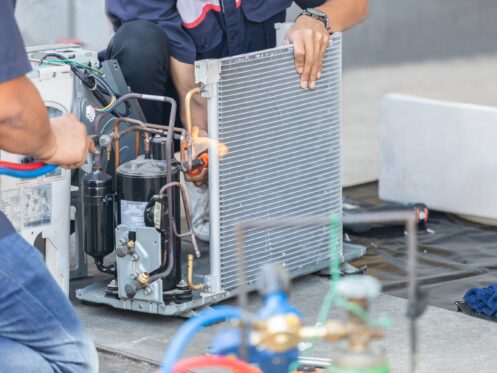Before the summer heat sets in, you need to figure out how you’re going to cool your home so that you and your family can be comfortable. There’s no doubt that central air conditioning can be a big financial investment. This may make you wonder if a portable air conditioner is the better choice. We’ll explain how both these options work to help you determine which one is the better investment for your household.
Portable AC Units
Portable air conditioners are specifically designed to cool down a particular space. They’re ideal for a living room or bedroom. These appliances are compact boxes that sit on the floor. A portable air conditioner works like an indoor air handler, pulling in air from the room and extracting heat from it. You simply plug the device into a wall outlet to power it.
All portable air conditioners require some sort of ventilation that allows them to send the heat they take out of the air to the outdoors. Unlike window air conditioners, portable air conditioners can be vented through walls, ceilings, and doors. Many come with a 3-to-4-inch exhaust vent hose. This is perfect for attaching to existing dryer vents.
The beauty of portable air conditioners is that you can install them in any room you would like. They’re movable, so you can switch from room to room as long as you have an adequate location for the vent hose. These units have a low up-front cost.
Central Air Conditioners
A central air conditioner is a whole-home air conditioning system that connects to ductwork. The indoor air handler is located in a hidden area of your home or connects directly to your furnace. The entire AC system is controlled by a thermostat.
Unlike portable ACs, a central air conditioning system will adequately cool all the rooms throughout your home because it will have both supply and return vents in each room. Central ACs are wired directly into your electrical panel box. These appliances cost a significant amount up-front as compared to portable air conditioners.
Energy Efficiency
When deciding between air conditioner installation options, one thing you definitely don’t want to forget to look at is their operating efficiency. Central air conditioners have a Seasonal Energy Efficiency Ratio 2 (SEER2). Portable ACs commonly have typically have Energy Efficiency Ratio (EER) ratings. The higher the rating, the more efficient the system is and the more money you can save on its operation. But bear in mind that SEER2 ratings show the average efficiency throughout an entire cooling season, while EER ratings represent efficiency under specific testing conditions.
In general, portable ACs have an EER rating of 6.6 to 12.3. Central air conditioners in Massachusetts can have a SEER2 rating anywhere between 13.4 and 30, with ratings up to 20 being typical for residential use. With central ACs, you have the option of purchasing high-efficiency systems to better capitalize on the potential energy savings. Typically, central air conditioners are two or more times more efficient than portable models.
Lifespan
Central air conditioners last on average between 15 and 20 years. Portable AC units have a lifespan of 5 to 10 years. The longevity of your system will depend on the amount of maintenance it receives, how often you use it, and many other factors.
Aesthetic Appeal
One noticeable difference between portable ACs and central ACs is their design. Portable air conditioners tend to be bulky units that are highly visible because they sit on your floor. Contrarily, central air conditioners are sleek in their design. The majority of the indoor components, like the indoor air handler unit, are in an inconspicuous location.
When it comes to indoor aesthetics, central air conditioners surpass portable ACs.
Operational Noise
One of the biggest differences homeowners pick up on between running a portable and a central air conditioner is their operational noise. Portable ACs will have a noise level between 50 and 70 decibels. A vacuum cleaner produces about 70 decibels. Because portable units are in a particular room, the noise in that room will be louder than some may like.
Central air conditioners typically operate at between 40 to 60 decibels — no louder than a normal conversation. Some, especially ductless mini-splits designed for quiet operation, can run at 30 decibels or fewer. The majority of the noise a central air conditioner makes will be at the outdoor condenser units. These systems make minimal noise indoors.
Maintenance Requirements
One thing to remember about air conditioners is they dehumidify the air as they run. This creates water waste that requires some sort of drainage. A central air conditioning system has a drainpipe that runs directly from the indoor air handler unit to an indoor drain or directly outdoors.
Portable ACs may come with a built-in collection pan that requires you to frequently dump out the water, or they may have a hose that you can run to a sink for automatic drainage. Central air conditioners do require professional maintenance every year to maintain their energy-efficient operation and warranty coverage.
Tax Credit Eligibility
The Inflation Reduction Act of 2022 rewards homeowners who invest in energy-efficient appliances for their homes. One appliance that qualifies for this credit is the central air conditioner. Any central air conditioner that has an ENERGY STAR certification can allow you to receive up to a $600 credit on your federal income tax returns.
Homeowners can claim up to 30% of the total cost of their new central air conditioner plus installation up to the maximum of $600. Many local utility companies will also provide you with a rebate on your energy bill to purchase a central HVAC system. Your local or state government may also issue tax credits. Portable air conditioners do not qualify for any of these credits or rebates.
Determining Your Best Option
One of the biggest things to consider when deciding whether to install a portable or central air conditioner is your living situation. Portable air conditioners are a popular option for renters. They offer an affordable way to provide cooling for specific areas without an invasive installation process.
They can also be a great option for homeowners who are on a tight budget and can’t pay to finance the purchase of a central air conditioner. However, do realize that you’ll have to purchase a portable unit for each of the main rooms of your home, which can add up.
Central air conditioning systems are a popular investment for homeowners looking to add air conditioning to all the rooms of their homes. They’re an easy solution that can keep you comfortable while boosting the overall resale value of your home.
Reliable AC Installation Service
DeWolfe Plumbing, Heating & Cooling offers reliable AC services for the Falmouth, MA region. We help with all your AC installation, replacement, repair, and maintenance needs.
Call us today to book your next service consultation or get answers to your air conditioning questions.


